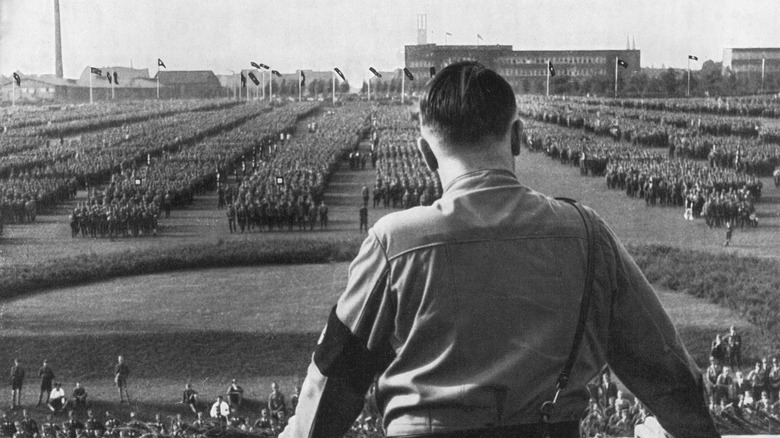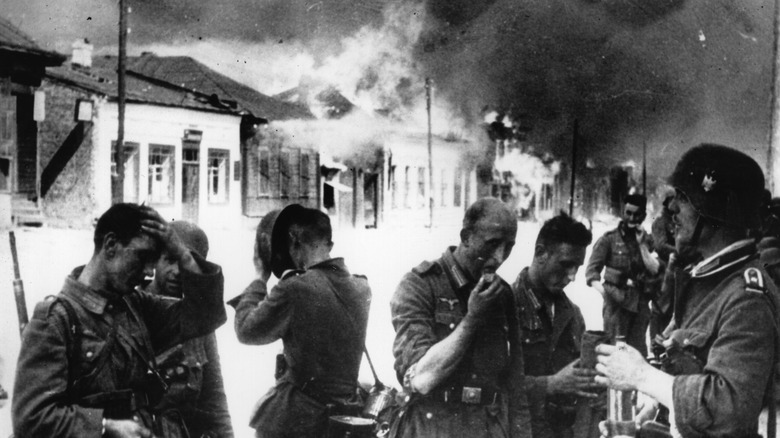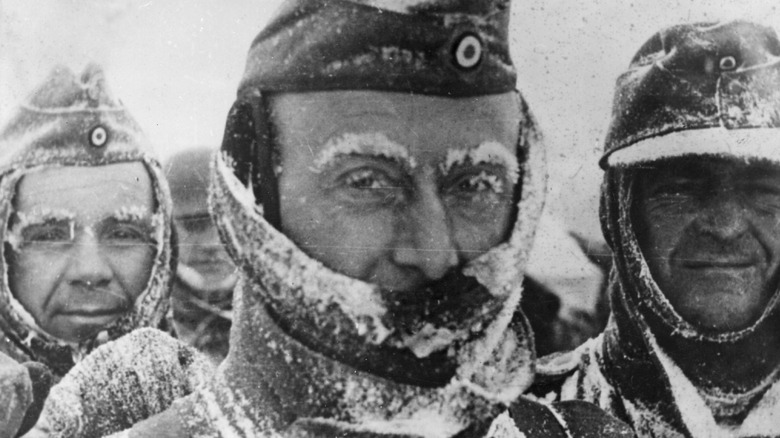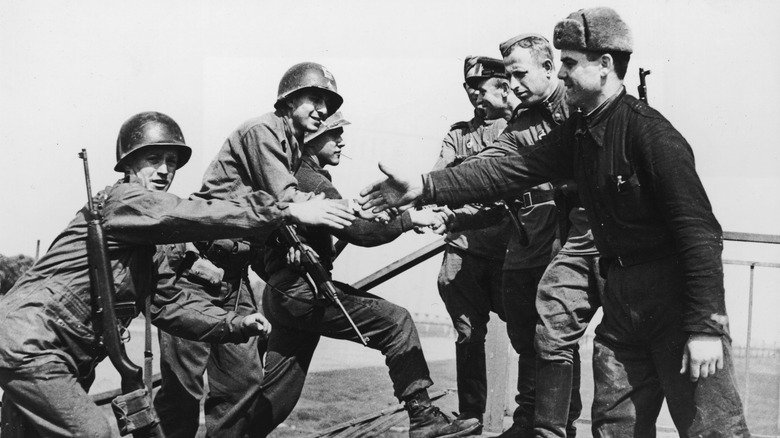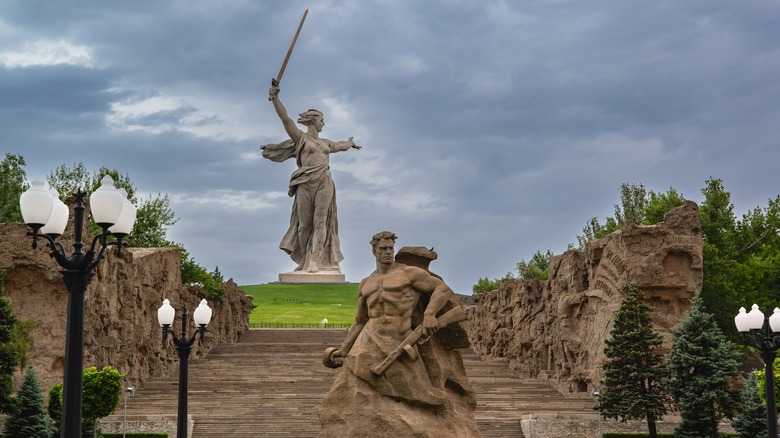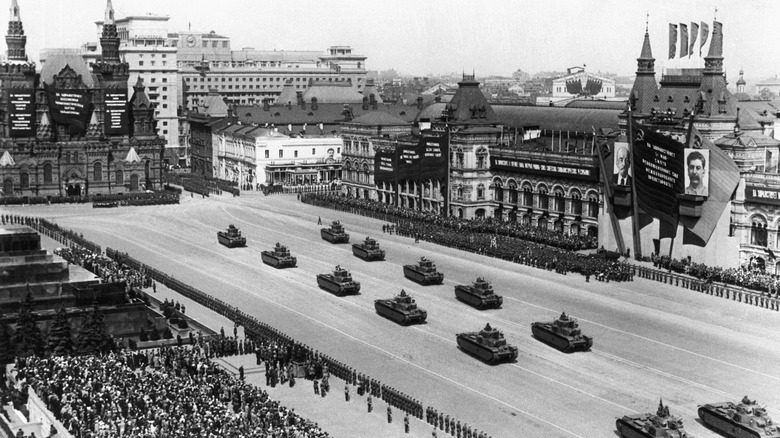The Big Reasons Why Hitler Couldn't Defeat The Soviet Union
So we all know Adolf Hitler and his legions fought the world, right? Fueled by their Führer's furious speeches, visions of a rekindled and glorious Germany, and hatred for a perfect post-World War I scapegoat for socioeconomic problems — Jewish people — German forces invaded north, south, east, and west from Poland on September 1, 1939, to Norway, Denmark, Belgium, the Netherlands, Luxembourg, and France in less than a year. But enough was never enough for Nazi Germany. Certain jewels of conquest awaited, like Russia. Fortunately for everyone, such ambition proved lethal.
On August 23, 1939 — only about one week before Germany invaded Poland — Germany and Russia had signed a 10-year non-aggression pact. As Germany started storming countries left and right, Russia stood still. In fact, as the Harvard Davis Center explains, Germany actually split Poland with Russia, and happily so.
But the two powers' tenuous arrangement wouldn't last. Come December 18, 1940, Hitler gave the order to attack his so-called ally. Thus began what Soviet propagandists subsequently referred to as the "Great Patriotic War," which lasted from the June 1941 enactment of Germany's assault plan, Operation Barbarossa, all the way until Russian troops took Berlin in May 1945. Nazi Germany couldn't win against Russia, no matter that they reached a mere 12 miles away from Moscow by December 1942. Russia was too big, too cold, its forces too dogged, German forces too spread out and too tired, and Russia had the backing of Allied powers, to boot.
Nazi Germany underestimated Russian resolve
There's no single reason why Nazi Germany lost its campaign against Russia. Rather, all reasons worked together simultaneously. That being said, there's a core reason that made all the other reasons work better: Russian stalwartness. Even though every tactical, technological, and military metric indicated Russian defeat, Soviet troops resisted long and hard enough to wear Germany down to the point where all the other reasons for Germany's loss proved overwhelming.
On paper, Adolf Hitler expected to steamroll Russia in 10 weeks. "We have only to kick in the front door and the whole rotten edifice will come tumbling down," Imperial War Museums quotes him. Hitler developed a three-prong incursion into the country: north, center, and south. Germany dispatched 1,700 Luftwaffe aircraft to level Russian positions ahead of German ground troops. In June 1941, Germany captured 320,000 Russian soldiers. In July they captured 300,000 more. In September they killed or captured 650,000 more. They covered 500 miles in the first three weeks. But, such speed meant that German forces were spread out, tired, and their supply lines strained.
Meanwhile, Soviet forces dug in. Joseph Stalin had over 5 million men to chuck under German treads. Quantity mattered, yes, as did Russia's enormous size. But it was Stalin's call to defend "Mother Russia" that really galvanized his troops. Hitler also made the situation worse by calling for Russian "annihilation" and declaring that all Russian officers be executed. Such brutality stoked Russian resolve and helped them hold their lines until autumn rains came.
Russia was too cold, too big, and too hard to traverse
It's often said that Russia proper as a single landmass has never been conquered, whether it be the Mongols in the 13th century, Napoleon Bonaparte's failed attempt in 1812, or Adolf Hitler's massive invasion in 1941, or any other time. This is true. During Operation Barbarossa, Hitler's forces were driven to a halt by some of the same problems that had driven other invading armies to a halt: Russia was too cold, too big, and its terrain too hard to traverse.
Timing was everything. Unless a ground army makes it all the way from the border of Russia to the capital, Moscow, during a specific seasonal window things are going to get tough. Hitler set out on June 22, 1941, and by the time German forces reached the outskirts of Moscow, autumn rain transformed the terrain into muddy soup.
When rain gave way to snow and the ground started to freeze German forces set out again in what Hitler dubbed "Operation Typhoon," but by then Russia had had time to muster its defenses. Plus, things got too cold. The German war machine faltered, physically, as its tanks, planes, and equipment started to fail. On top of this, the further Germany pressed the longer its supply lines became, which proved doubly difficult in winter months — on top of Germany already having a war effort on multiple fronts. Russia, meanwhile, was not only used to fighting in the cold, but they were good at it and had little trouble dealing with supply lines.
Russian allies in the West
No matter Russia and the West's decades of Cold War and deteriorated relationship following World War II, it's important to remember that Russia joined the fight on the side of the Allies. At least, as soon as Germany flip-flopped on their non-aggression pact and Russia had to protect itself. Russia entered the fray the very month that Hitler invaded, in June 1941, and was crucial to winning the war. They did so at great cost, as the Soviet Union lost more troops and civilians than any other country, up to 10,700,000 military deaths and 24,000,000 civilian deaths total, according to the National WWII Museum.
As the U.S. State Department recounts, however, relations with Russia weren't exactly smooth sailing. Strangely enough, it was the United States who brokered a deal with Russia to join the war via the President Roosevelt-appointed attaché Harry Lloyd Hopkins. Hopkins met with Stalin, liaised with Britain, and set the stage for Russia to jointly invade Iran with Britain to prevent Germany from gaining a foothold there. Also, this took place months before the U.S. entered the war. Russia had other conditions and demands, though, like refusing to help Poland and wanting the Allies to invade France to attack Germany – the latter never happened.
Ultimately, unity won the day. Because the U.S.S.R. joined forces with the Allies it gained Allied backing and supplies, including monthly stipends of tanks and aircraft. This helped fortify the Russian war effort, which single-handedly held against Germany's Eastern European front.
Hitler's second attempt at Stalingrad
Nazi Germany didn't fail at invading Russia once, but twice. Operation Barbarossa from June to December 1941, marked the first attempt. Hitler wanted to try again the following year, this time through the south because Germany had captured much of Ukraine and Belarus. On August 23, 1942, Hitler did just this, with the express goal of capturing Stalingrad. But much like the first time, Hitler made some dumb mistakes. As History explains, Hitler once again self-defeatingly announced how brutally he would treat Russians, even proclaiming that he would kill off Stalingrad's male civilians and ship off all of its women. He also wanted Stalingrad for prestige purposes because the name of the city contained Joseph Stalin's name.
Much like during Operation Barbarossa, the desire to protect Russian people and pride strengthened Russian resolve. Plus, Stalin deliberately did not evacuate the city's 400,000 residents to further incentivize Russian troops, even if it meant placing civilians in harm's way. Stalingrad was locked into combat all the way until February 1943, but was totaled by autumn, 1942. Nonetheless, Russian troops held firm, reinforcements arrived, and after hard, grueling combat, Germany lost. About 500,000 German soldiers died and another 100,000 Germans died in prison camps. But given the Russian winter they'd endured, many were already starving, anyway. In the present, the Battle of Stalingrad is regarded as one of World War II's most decisive battles and a turning point in the overall war.
Germany's weakened war machine
As we explained, the Russo-German war front constituted only one front of many for Nazi Germany. As the Holocaust Encyclopedia shows, Germany's location in central Europe meant that it had to push out against all sides if it intended to win the war. It succeeded at first, accumulating territory in rapid succession during World War II's first months. But it ran out of gas quickly, figuratively and literally. It was spread thin and needed allies like Romania to supply it with raw materials.
Germany could have had much more in the way of resources, though, if it had remained allies with Russia. Russian oil could have poured into Germany throughout the whole war. Instead, Germany attacked its ally, lost its main oil flow, and then proceeded to commit enormous resources to conquering Russia in the way of Operation Barbarossa and the Battle of Stalingrad. This in turn drained Germany all the more, and by 1942 the country had already largely shifted from territorial expansion to maintaining what territory it had already conquered.
In other words, Hitler's own rapaciousness and shortsightedness crippled Nazi Germany from the get-go, especially when placed face-to-face with Russia. The loss of Russian support weakened Germany's overall war effort, including Germany's ability to conquer Russia. This was all foreseeable, as sites like We Are the Mighty explain, given how reliant the German war effort was on others for resources.
